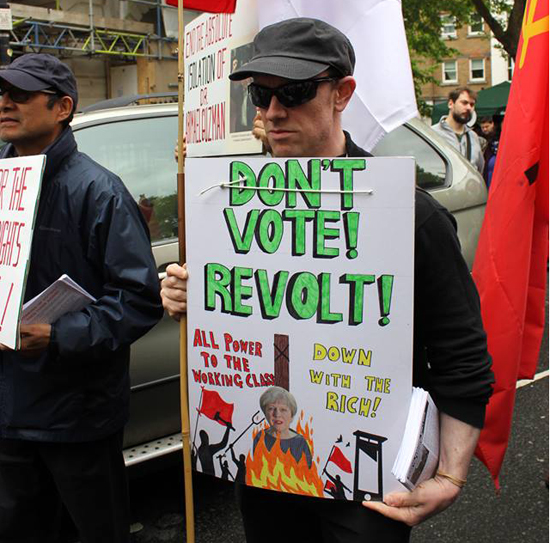
It has been a surprising ‘snap’ election campaign ever since Prime Minister May broke yet another pledge – in this case not to call an early election – when she saw the chance to settle Tory divisions with an easy victory against both Labour and UKIP before economic and political chaos (the Brexit negotiations) besets Britain.
The overwhelmingly-Tory press performed as required, desperately trying to deflect voters’ attention from May’s U-turns and miscalculations on social care and police numbers, filling their pages with calls for more immigration controls and fewer human rights. George Osborne, former Chancellor deposed by May, now press baron (editor) at the London Evening Standard, spent the entire campaign lobbing criticisms at May, but came up with resounding support just before polling day to maintain his Conservative credentials. He needn’t have bothered: May’s tottering campaign meant he could resume the lobbing even before the count was complete.
After months of vilification and secret plotting by 80% of his colleagues in the parliamentary Labour Party and the media, leader Jeremy Corbyn managed to put up a fight to emerge as a left hero – the sort the British ruling class loves best (almost winning, but not quite). He forgave all his critics. Days before the election, The Guardian came down in favour of a Labour victory, having spent the previous 18 months printing diatribes from Corbyn’s critics on the Party’s right-wing about his total unsuitability as a future Prime Minister. Never mind all that; this was the brief apogee of British democracy – the general election.
Two tragic terrorist attacks on the British public, in Manchester and London, delivered a sharp dose of reality to this ‘Game of Thrones’. May took the opportunity to quickly leap onto the press podium outside 10 Downing Street on 4 June, suitably attired in black with jewellery, to deliver a message to the electorate: ‘Enough is enough.’ She promised a review of counter-terrorism strategy, ramping up repression, clamping down on the internet and longer prison sentences for even minor terrorism offences: ‘While we have made significant progress in recent years, there is – to be frank – far too much tolerance of extremism in our country.’ These promises were designed, five days before polling, to bolster voters whose loyalty had certainly been tested by the earlier wobbling on social care, winter fuel payments and the pension triple-lock.
May’s response to the attacks was nothing new. Throughout the 20th century British governments, Conservative and Labour alike, did not hesitate to ramp up state repression against any opposition. Internment without trial, for instance, was introduced in the north of Ireland in 1971 with the full support of all parliamentary parties, and the Prevention of Terrorism Act 1974 was adopted within three days by the House of Commons with minimal opposition. Both measures resulted in indiscriminate incarceration and harassment of the Irish community.
With a different enemy in view, it was the Blair Labour government in 2005 that was responsible for the introduction of control orders, effectively indefinite detention without trial outside the criminal justice system. The Coalition government in 2012 substituted the only slightly less punitive Terrorism Prevention and Investigation Measures (TPIMs) when control orders were criticised by the Law Lords for breaching human rights. Clearly May has a renewed control order system in her sights in 2017 and will be ready to dispense with human rights laws in order to achieve this.
The British state’s definition of who is a ‘terrorist’ is equally opportunist. Nelson Mandela was dubbed a terrorist by Prime Minister Thatcher in the 1980s when she was keen to sabotage sanctions against the apartheid state by the Commonwealth states that would have affected British trade. In the same decade, while the IRA was made the target of all manner of repressive laws, including media censorship, Loyalist groups in the north of Ireland were free to pursue murder and terror against the catholic community. In recent conflicts, for instance Syria, Iraq and Afghanistan, Britain has sponsored openly jihadist groups engaged in terrorism for its own foreign policy ends. The recent Manchester suicide bomber’s background in Libya is very revealing about the licence given to members of anti-Gaddafi groups when it suited British imperialism’s purposes. Likewise, efforts are being made to cover-up the role of states sponsoring terrorism like Saudi Arabia and Qatar when British arms sales are involved. (See reports on pages 10 and 11.)
Today Corbyn’s team has been quick to pick up the baton on law and order, blaming May for cutting police numbers by 20,000 when she was Home Secretary, and repeating its earlier promise to recruit 10,000 police officers and 1,000 security service agents, even if it is unsure about how much this will cost. Under pressure following the London Bridge attack, Corbyn was very quick to revise his former opposition to ‘shoot to kill’ policies: ‘I will take whatever action is necessary and effective to protect the security of our people and our country. That includes full authority for the police to use whatever force is necessary to protect and save life as they did last night.’ New recruits to supporting Labour will need to examine the facts surrounding the police killing of Jean Charles de Menezes at Stockwell tube station in 2005, let alone Labour’s history of stalwart support for British imperialism come what may (see Labour: a party fit for imperialism, Robert Clough, Larkin Publications) to understand what such unlimited force includes.
As May prepares to drive to Buckingham Palace to agree with the unelected head of state, the Queen, on the ‘democratic’ rule of the British people by a stitched up government dependent on a deal with 10 neo-fascist DUP MPs in the north of Ireland, we echo her words, enough is indeed enough!
Carol Brickley
Fight Racism! Fight Imperialism! 258 June/July 2017




